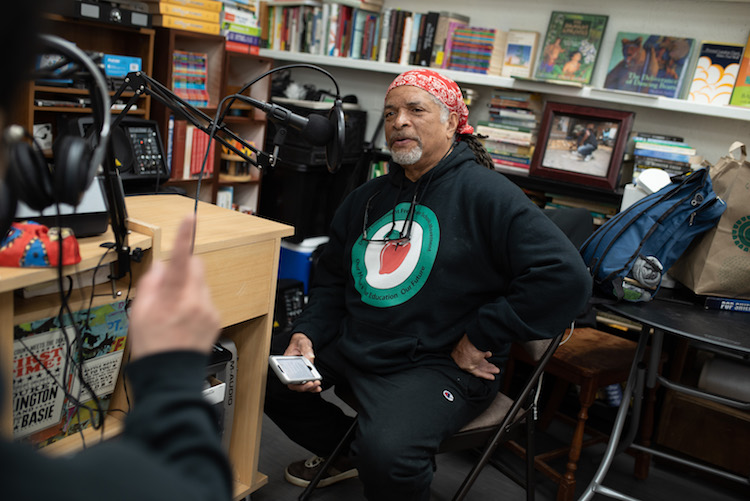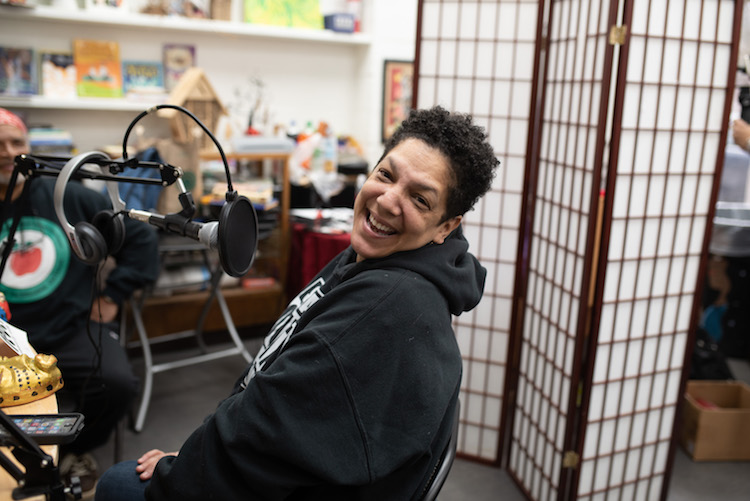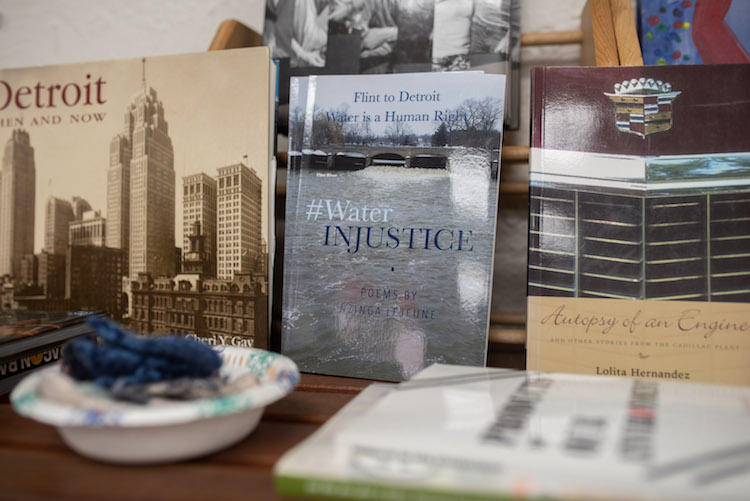How KAN Books in the North End amplifies voices of local writers and media makers
KAN Books relocated to a renovated storefront on John R Street in the North End last year. The co-op bookstore hopes that its expanded space in a redeveloped building will allow it be of use to even more community members.
Deena Allen has been interested in writing since she started participating in an after-school writing class when was about 7 years old. By the time she was 15, she was a published author.
As a member of KAN Books, and the poetry and entrepreneurship youth group Illuminate, she published her first project, “Infinite,” and celebrated the launch with a book and CD release party in January 2018 at the co-op bookstore.
The Cass Technical High School student, now 16, is one of the 20 co-op members of KAN Books. She became a member of the worker-cooperative business after working with owner Jamii Tata on her writing.

In September last year, KAN Books relocated to a renovated storefront on John R Street in the North End. It officially opened in December.
The bookstore hopes that its expanded space in a redeveloped building with other retail businesses will allow it be of use to even more community members like Deena.
“It’s really important to have a place where not just me,” Deena say, “but a lot of the other kids in the neighborhood can go to express themselves through writing or just want to read or just want to have somewhere to go.”
She likes being able to walk around the corner to the bookstore where “you can just openly express yourself with no judgment.”
Empowering youths like Deanna to not only write, but also learn to be entrepreneurs, is one of the many facets of Tata’s work. Events such as the release party for her book helps youths learn the business, and events like open mics teach kids how to run mics and the mixing board.
As a professional artist, Tata feels he is “empowering youth to learn the business side and run the show.” He adds that, “Learning doesn’t just happen at school. I’m interested in alternative forms of education not just within four walls of a classroom.”
Teresa Lee-Allen, Deena’s mom, says KAN Books is a community-forward space that amplifies the voices of the people it serves. It’s also a safe space for her daughter to work or hang out. “She’s like, ‘Mom, I’m going to the bookstore.’ So I know that she’s there. I know that she’s safe. I know that there’s something going on that’s positive.”
She’s seen her daughter’s writing evolve since Deanna became a member of the bookstore. “It allows (youth) to see that they can do these things as for themselves and create their own model versus taking on the model that somebody else is trying to lay out for them.”
Filling a void
Tata opened the store in December 2017 as a way to support emerging writers of color from Michigan. As the founder of Know Allegiance Nation, which he started more than 10 years ago to build a nation of knowledge seekers and raise consciousness, as well as an urban farmer and president of Oakland Avenue Arts Coalition, Tata brings all of that work into one space with KAN Books.
The bookstore connects writers and artists to resources in one space. Membership levels range from $5 and 20 volunteer hours to $100 and no hours a month. As a member, writers and artists can place their work in the store, share vendor booths, and get discounts toward event space and technology. In exchange, they work in the bookstore selling books, recruiting members, and supporting events.
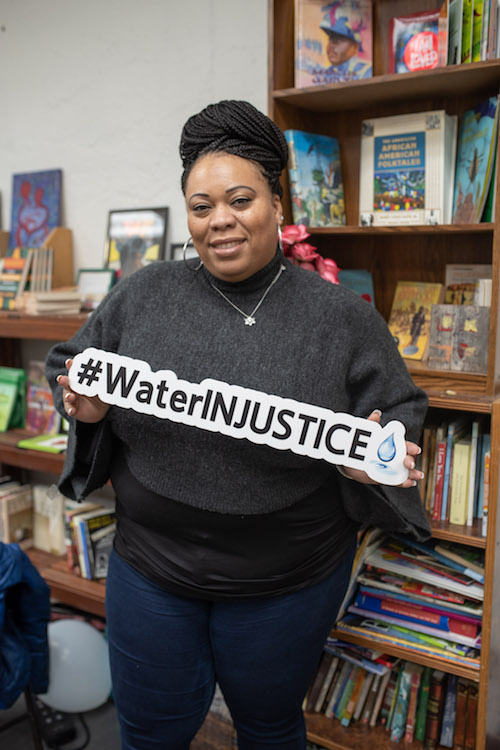
On any given weekend, the bookstore is probably hosting an event, whether it’s a writing workshop by Riverwise Magazine or a seed-packing event with Keep Growing Detroit.
On a recent Saturday, Illuminate hosted an open mic featuring Nzinga LeJeune, author of the poetry book “#WaterINJUSTICE” and filmmaker of a short documentary of the same name. Outraged by the water crisis in Flint, water shutoffs in the city of Detroit, and lead in Detroit students’ water, she channeled that anger into her first book and a short documentary, which she released in 2017.
The bookstore brings awareness to her work, says LeJeune. She’s always wanted to own a bookstore, but as a member, she can give back to the place that supports her and support a black-owned business.
“#WaterINJUSTICE” can be found in black-owned bookstores across the country from Los Angeles to Washington, D.C.
KAN Books is important in a community like the North End because, LeJeune says, it serves as a space for youths to be after 3 p.m. when school’s out. As a former teacher in the Highland Park school district, she says after the schools closed, the community became a “literacy desert.”
“KAN Books fills that void,” she says.
Tata also sees his bookstore as an opportunity for residents to have access to literacy resources. “There’s no library here. There were many schools at one point … North End needs this as a literacy hub.”
With Tata’s work in urban farming and Know Allegiance Nation, many events are intertwined. An example of this is the community event Bikes, Barrels, and Books, which he is planning to hold again this summer. The fair focuses on mobility, sustainability and literacy resources through workshops and demonstrations.
Finding their voices
KAN Books is amplifying the voices of more than just writers and empowering those who don’t consider themselves media makers. He’s also using his audio skills to teach others how to do audio storytelling and broadcasting by offering the space as a recording studio.
On a recent Saturday afternoon, Nikolette Barnes sits behind the mixing board, headphones on and mic in front of her as she prepares to record her show Black Gold: Stories of Urban Farming, Gardening and Beyond. In front of her are two guests: Lottie Spady and Kwamena Mensah. Today they’re sharing personal stories about the medicinal properties of growing food and how it’s impacted their lives.
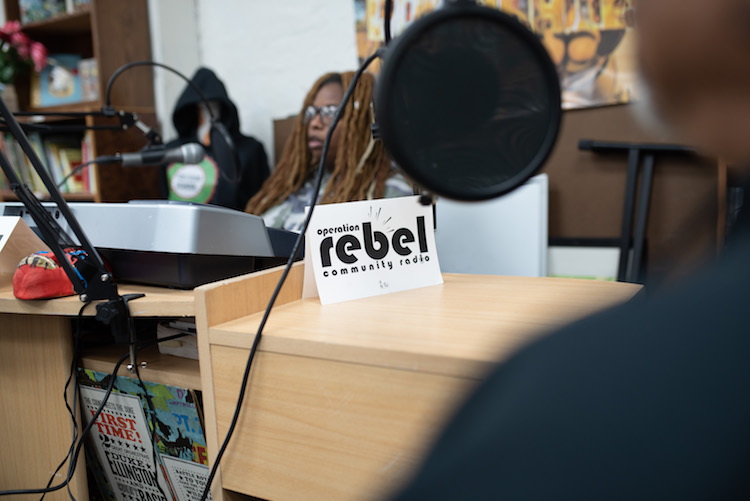
Spady, an herbalist and environmental justice activist, talks about how her father had just passed and the therapeutic effects of working with purslane and watermelon. Most people think of purslane as a weed, she says, but there’s a beneficial relationship between the two.
Mensah talks about how diabetes led him to grow his own food. Anything with a healing property, he says, can’t be found at CVS or Rite-Aid — it’s right in the soil.
The show is more of an intimate conversation rather than three people behind mics, and that’s what Barnes is going for. As a nutrition educator, she’s more comfortable behind the scenes, but after one day working in the garden, Barnes recalls Tata telling her they should have a show to tell stories from the urban agriculture community.
The show is set to debut this Sunday on Operation Rebel, an online community radio station, which Tata hopes to expand to a 24/7 operation this spring with content from other community members talking about social justice, skateboarding, food, and more.
Tata has high aspirations for the station, hoping it will one day be the “NPR of the neighborhood.”
This article is part of a series where we revisit stories from our On the Ground installment and explore new ones in the North End. It is supported by the Kresge Foundation.
Photos by Valaurian Waller.
